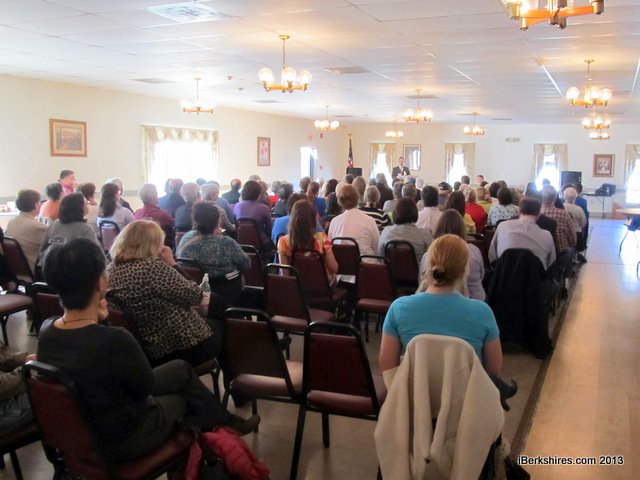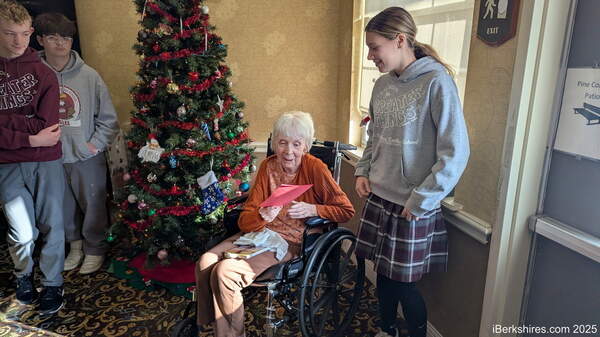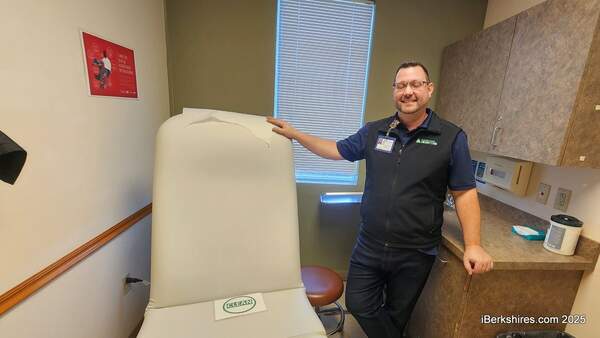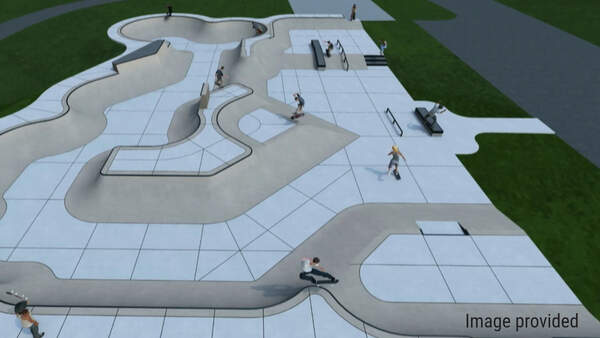State Wants Detailed Plans on NARH Unit Closures
 About 150 people showed up to the Nov. 1 meeting on the closure of the Greylock Pavilion. The Department of Public Health said the unit, as well as the pediatric unit, should not be closed in response. About 150 people showed up to the Nov. 1 meeting on the closure of the Greylock Pavilion. The Department of Public Health said the unit, as well as the pediatric unit, should not be closed in response. |
NORTH ADAMS, Mass. — The state Department of Public Health has responded to North Adams Regional Hospital's plans to close its pediatric unit and Greylock Pavilion with queries on how the services will continue to be made available.
DPH's questions come after reviewing testimony from public hearings held on Nov. 1. The agency refers to the services as essential and necessary and asks first if the closures can be delayed "to work with the community to assess options other than closure?"
The hospital officials say the answer is no.
"Even though the the first question is 'can the hospital delay the closure,' that's not a recommendation — that's a question," said Paul Hopkins, spokesman for the Northern Berkshire Healthcare. "The answer is no and we have to continue to implement the plan."
Officials are confident that the closures will help the health system's continued viability and that DPH will find its plans to address the services as adequate.
In a statement released by NARH on Wednesday, the staff and leadership's most important task is "meeting the needs of our patients and our community of our patients and our community for safe, quality care close to home."
While the hospital agrees providing pediatric and behavioral health services are necessary for the community, the "dynamics in health care" is heading toward a more regional, not local, direction, hospital officials said.
"Doing so ensures that staff will be well trained and experienced in the area of service and that resources across the region are effectively used," the statement reads, also noting regionalization and partnerships with other health care providers are "critically important to the financial stability" of NARH.
The statement credits investments to new cardiac monitoring capability and training the current staff in that area, recruiting new doctors and updating equipment, such as the region's only large-bore MRI unit, to this cause.
The letter from DPH requires NARH to provide more information about its plans to assure the community will receive services it needs. The statement said NARH is confident the plans are in place, including:
-
Transitioning inpatient behavioral health services to Berkshire Medical Center, allowing patients to go directly to an inpatient bed at Berkshire Medical Center and streamline Emergency Department transfers.
-
Strengthening its ability to screen emergency behavioral health cases at NARH.
-
Expanding outpatient behavioral health services through primary care medical practices and the VNA and Hospice of Northern Berkshire.
-
Preparing for extended observation care for pediatric patients in the Emergency Room.
-
Continuing its transfer relationship with Baystate Medical Center for pediatric patients requiring inpatient services.
According to a release from the Massachusetts Nurses Association, Susan Revotskie, a psychiatric nurse who works in the Greylock Pavilion, said she appreciated the department's findings.
"Our hope now is that our administration will heed the DPH's call to work with the community to develop an alternative plan for these services that will keep them open for those in need of care," Revotskie said.
At the hearing for the proposed closure of the Greylock Pavilion, mental health workers and nurses testified that closing it would put community members at risk, strain families and disrupt and possibly endanger emergency room workers dealing with patients in crisis. Other concerns arose about transportation for patients.
"We need a place close by, where our friends and family can visit us without having to go all the way to Pittsfield for help," said one man at the Nov. 1 hearing. "Please take care of basics here ... for the people who have problems here."
However, hospital directors worried about the financial health of the hospital. Larry Taft, director of finance, said the hospital operates with less than 20 days of cash while typical hospitals operate with around 100.
Colleen Hunkler, a critical care nurse at the hospital, spoke in opposition of the plan and had concerns for the families whose children are "shipped to hospitals far from home for the care they once received right here."
Dr. Fernando Ponce, who runs the Emergency Room, said he's been comfortable with his staff serving children and understands the hospital needs to adapt to a changing environment.
The Department of Public Health reviewed those statements and submitted its letter within 15 days after. Now, the hospital has 15 days to respond assure access to these services.
Text from the letter from the Department of Public Health to North Adams Regional Hospital:
RE: North Adams Regional Hospital – Essential Services (FMF#2061-055)
On November 1, 2013, the Department of Public Health ("Department") held a public hearing in response to the notification received from North Adams Regional Hospital ("the Hospital"), regarding plans to discontinue the provision of pediatric services and inpatient psychiatric services effective January 2, 2014.
In addition, the Department has reviewed the information that you have provided to our staff regarding the level of service currently provided in your pediatric, inpatient psychiatric and intensive care units, the challenges you face in your efforts to ensure the viability of the Hospital, and your plans to improve the overall quality of health care services in the community. Thank you for sharing this information with us.
It is the understanding of the Department, based on the notice referenced above, information provided to the Department by the Hospital and the presentation of the Hospital at the hearing that:
While licensed for five pediatric beds, the Hospital currently operates two pediatric beds, which the Hospital has proposed will be closed. Upon closure of its pediatric service, the Hospital will provide what it describes as "episodic care" in its Emergency Department with subsequent observation for up to six hours of pediatric patients who present with an emergent condition, while transferring those who present with a high acuity illness or require an inpatient admission.
While licensed for twenty inpatient psychiatric beds, the Hospital currently staffs at a level sufficient to operate eleven inpatient psychiatric beds, which the Hospital has proposed will be closed. Subsequent to closure of its inpatient services, the Hospital will provide outpatient psychiatric services described as "intake, referral, therapy, medication management and community supports."
As a result of its review of information provided to the Department by the Hospital, and the testimony of patients, staff and numerous members of the community both at the hearing held on November 1, 2013, and by email directly to the Department, the Department finds that the pediatric services and inpatient psychiatric services the Hospital has proposed to discontinue are necessary for preserving access and health status in the Hospital’s service area.
Accordingly, under 105 CMR 130.122(G) the Hospital is required to prepare a plan that details how access to these services will be maintained. The plan must be submitted to the Department within 15 calendar days of this letter and include the following elements:
-
Information on utilization of the service prior to proposed reduction;
-
Information on the location and service capacity of alternative delivery sites;
-
Travel times to alternative service delivery sites;
-
An assessment of transportation needs post reduction of services, and a plan for meeting those needs;
-
A protocol that details mechanisms to maintain continuity of care for current patients of the reduced service; and,
-
A protocol that describes how patients in the Hospital’s service area will access the services at alternative delivery sites.
Numerous members of the community have commented to the Department that they rely on North Adams Regional Hospital when they need hospital services, especially in winter months when travel to another facility outside the community can be difficult. In addition to the elements above, the plan submitted by the Hospital must address the following concerns of the Department;
Pediatric Services:
-
Can the Hospital delay closure of its inpatient pediatric service in order to work with the community to assess options other than closure?
-
How will the Hospital ensure that pediatric patients treated in the Emergency Department, and who remain for observation, are in an environment that is suitable for children?
-
What will be the impact on the Hospital's Emergency Department of keeping pediatric patients for observation following treatment in the Emergency Department? Please ensure your response includes your projections on volume, and how this will impact on staffing in the emergency Department.
-
How will the Hospital ensure that staff providing care to pediatric patients or observing pediatric patients seen in the Emergency Department are competent in the standards of practice for pediatric patients?
-
Will the Hospital perform surgery on pediatric patients, and if so what types of surgery and under what conditions? Who will monitor these patients, where and how will the Hospital ensure that staff providing care to pediatric patients or monitoring patients following surgery are familiar with the standards of care for pediatric patients?
-
How will the Hospital mitigate the impact of closing its pediatric service on area ambulance services in light of the travel time from the Hospital to other facilities when transfer for an inpatient admission is necessary to treat a patient?
Psychiatric Services:
-
Can the Hospital delay closure of its inpatient psychiatric service in order to work with the community to assess options other than closure?
-
How will the Hospital ensure that the Behavioral Health Pod to be developed in its Emergency Department will provide a supportive environment to patients being treated, and minimize disruption to other patients and staff in the Emergency Department?
-
How will the Hospital mitigate the impact of closing its inpatient psychiatric service on both patients and families in light of the limited public transportation services available in the community? Please describe what services will be available, when and at what cost for families of patients admitted to other facilities.
-
How will the Hospital mitigate the impact of closing its inpatient psychiatric service on area ambulance services in light of the travel time from the Hospital to other facilities when an inpatient admission is necessary to treat a patient?
Under the provision of 105 CMR 130.122(H), the Department will consult with the Department of Mental Health in its review of the portion of the plan the Hospital submits related to the closure of the inpatient psychiatric service to determine if the plan assures access following the Hospital’s proposed closure of the services. Following its review, the Department will advise you in writing of any remaining comments or concerns. The Hospital is required to submit a timely response to any such comments.
Updated at 7:10 p.m., Nov. 20, 2013, with further comment.
Tags: closure, NARH, pediatrics, psychiatric,
 About 150 people showed up to the Nov. 1 meeting on the closure of the Greylock Pavilion. The Department of Public Health said the unit, as well as the pediatric unit, should not be closed in response.
About 150 people showed up to the Nov. 1 meeting on the closure of the Greylock Pavilion. The Department of Public Health said the unit, as well as the pediatric unit, should not be closed in response.














